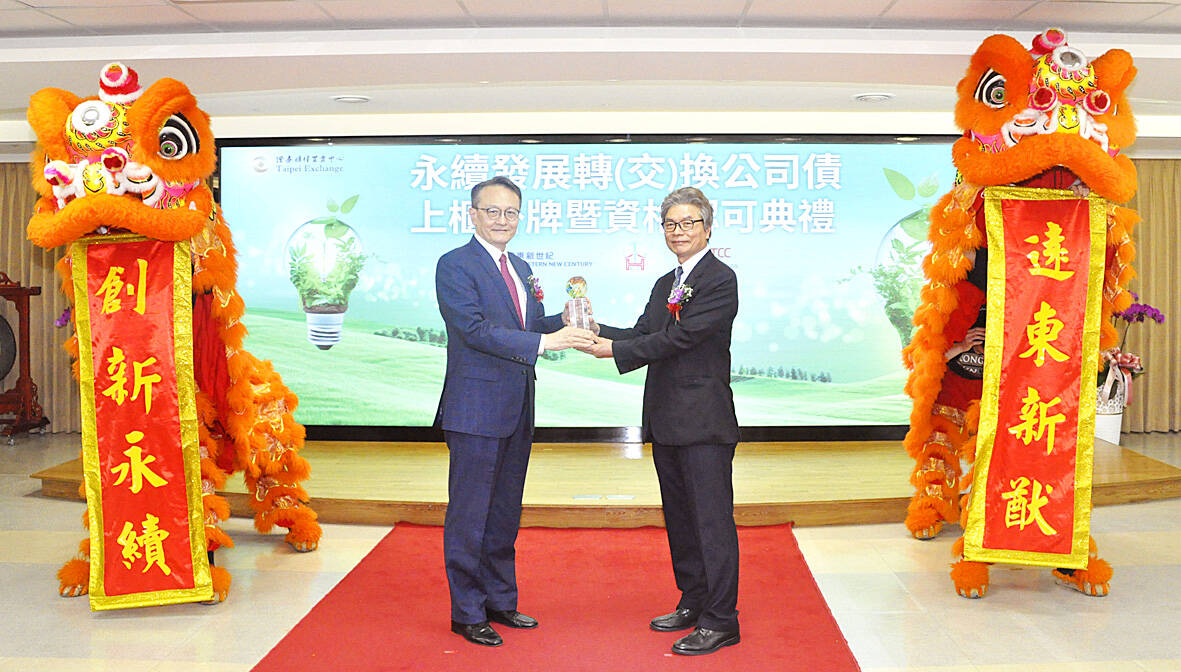In response to the government’s sustainable development policy, Far Eastern New Century Corp (FENC, 遠東新世紀) was the first company to be qualified to issue a sustainable development exchangeable bond.
The exchange bond was listed and began trading on the Taipei Exchange yesterday. As the lead underwriter, KGI Securities Ltd (凱基證券) facilitated the issuance, driving Taiwan’s sustainable bond market toward a new milestone.
The issuance involved exchangeable bonds for NT$1 billion of Asia Cement Corp (亞洲水泥) and NT$1.5 billion of Far Eastern Department Stores Co (遠東百貨) with a term of five years.

Photo courtesy of Far Eastern New Century Corp
“To cope with an era of carbon pricing, corporate entities must address the impacts of climate change and provide responsive solutions toward decarbonization, transforming the challenge into a strength in order to take the lead in the race to net zero,” FENC chairman Douglas Hsu said.
FENC, an innovative industry pioneer, responded to the government’s sustainable development policies and integrated financial planning seamlessly into its corporate sustainability strategies.
FENC was the first to offer several sustainable financial products in Taiwan with great success, channeling investment funds into sustainable projects from diverse sources, and fostered a positive cycle among government and corporate entities, and investors.
Taipei Exchange released the guidelines for sustainable development bonds in December last year, allowing convertible bonds to be issued within the scope of sustainable development bonds, with an aim to expand the market for sustainable development bonds.
FENC took the initiative once again and successfully issued the first corporate sustainable development exchangeable bond, to set an example and encourage more corporate entities to participate in sustainable development.
The funds raised by the FENC listing are to be used to support investment projects with green benefits for the company and its subsidiary, Oriental Petrochemical (Taiwan) Co Ltd (亞東石化股份有限公司). With measures to improve manufacturing processes, equipment and energy management, the company aims to actively achieve sustainability transformation goals — reduce greenhouse gas emissions by 50 percent, grow green products to 50 percent and utilize 50 percent green feedstock by 2030.
This would contribute to the overall long-term operational development of the company, as it strives to practice environmentally friendly and socially prosperous sustainable business principles.
KGI Securities ranks No. 1 for underwriting market share and has actively responded to the government’s promotion of sustainable financial policies.
KGI assists corporate entities to channel funds into investment projects with environmental and social benefits. As the main underwriter for several sustainable development-related bonds, KGI helps corporate entities and financial issuers to successfully raise funds, grow and excel in the capital market, while demonstrating the mission to implement corporate sustainability.
KGI provides sustainable financial solutions and contribute heartfelt efforts to sustainability development for the benefit of society.

CHIP RACE: Three years of overbroad export controls drove foreign competitors to pursue their own AI chips, and ‘cost US taxpayers billions of dollars,’ Nvidia said China has figured out the US strategy for allowing it to buy Nvidia Corp’s H200s and is rejecting the artificial intelligence (AI) chip in favor of domestically developed semiconductors, White House AI adviser David Sacks said, citing news reports. US President Donald Trump on Monday said that he would allow shipments of Nvidia’s H200 chips to China, part of an administration effort backed by Sacks to challenge Chinese tech champions such as Huawei Technologies Co (華為) by bringing US competition to their home market. On Friday, Sacks signaled that he was uncertain about whether that approach would work. “They’re rejecting our chips,” Sacks

Taiwan’s long-term economic competitiveness will hinge not only on national champions like Taiwan Semiconductor Manufacturing Co. (TSMC, 台積電) but also on the widespread adoption of artificial intelligence (AI) and other emerging technologies, a US-based scholar has said. At a lecture in Taipei on Tuesday, Jeffrey Ding, assistant professor of political science at the George Washington University and author of "Technology and the Rise of Great Powers," argued that historical experience shows that general-purpose technologies (GPTs) — such as electricity, computers and now AI — shape long-term economic advantages through their diffusion across the broader economy. "What really matters is not who pioneers

In a high-security Shenzhen laboratory, Chinese scientists have built what Washington has spent years trying to prevent: a prototype of a machine capable of producing the cutting-edge semiconductor chips that power artificial intelligence (AI), smartphones and weapons central to Western military dominance, Reuters has learned. Completed early this year and undergoing testing, the prototype fills nearly an entire factory floor. It was built by a team of former engineers from Dutch semiconductor giant ASML who reverse-engineered the company’s extreme ultraviolet lithography (EUV) machines, according to two people with knowledge of the project. EUV machines sit at the heart of a technological Cold

TAIWAN VALUE CHAIN: Foxtron is to fully own Luxgen following the transaction and it plans to launch a new electric model, the Foxtron Bria, in Taiwan next year Yulon Motor Co (裕隆汽車) yesterday said that its board of directors approved the disposal of its electric vehicle (EV) unit, Luxgen Motor Co (納智捷汽車), to Foxtron Vehicle Technologies Co (鴻華先進) for NT$787.6 million (US$24.98 million). Foxtron, a half-half joint venture between Yulon affiliate Hua-Chuang Automobile Information Technical Center Co (華創車電) and Hon Hai Precision Industry Co (鴻海精密), expects to wrap up the deal in the first quarter of next year. Foxtron would fully own Luxgen following the transaction, including five car distributing companies, outlets and all employees. The deal is subject to the approval of the Fair Trade Commission, Foxtron said. “Foxtron will be